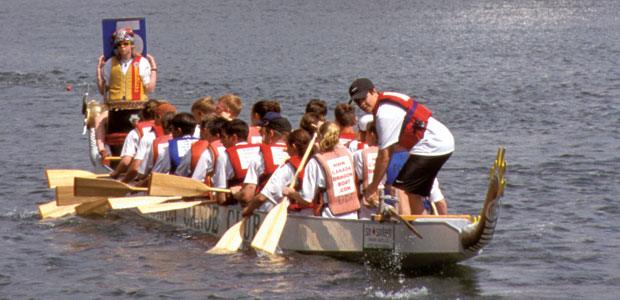Advertisement
Dragon Boating
Smoothing post-cancer waters

Many people take up paddle sports to enjoy the tranquility and serenity of slicing quietly through calm waters. Not so with dragon boat paddlers.
If you’ve ever shared a tranquil waterway with dragon boaters, you’ll know that serenity isn’t part of their experience. Instead, you’re more likely to have heard the rhythmic thud of a drummer
pounding out the heartbeat of the boat, the shouting of the captain encouraging the crew, and water churning as paddles are thrust and pulled.
The pure energy and drama surrounding dragon boat racing has attracted thousands to the sport in recent years, although organized dragon boat competitions have taken place annually for over 20 centuries, originating in China over 2,000 years ago.
Many of these modern-day dragon boaters are breast cancer survivors. For these women, the adrenalin and power they generate by their own efforts provide a sense of community and empowerment that is helping thousands of women move successfully beyond recovery.
In the past, women who had lymph nodes removed were advised to avoid exercise, especially of the upper body, for fear that it would cause or aggravate lymphedema, a swelling in the lymphatic system.
A stroke of genius
Dr. Donald McKenzie, a sports medicine physician and researcher at the University of British Columbia, challenged this assumption. McKenzie believed that lymphedema could be prevented with physical activity because “it can improve range of motion and reverse muscle atrophy, activate skeletal muscle (which may help pump lymph), stimulate the immune system, and reset the sympathetic tone of the lymphatic vessels.”
McKenzie recruited a team of 24 women, all cancer survivors, to form a dragon boat crew, calling the team “Abreast In A Boat.” Dragon boating was chosen for several reasons, including its focus on upper body and trunk strengthening, while the risk of injury was reduced because it is a non-weight-bearing form of exercise.
The team practised twice weekly from April 1996 and competed in their first race in June 1996. Among the team members, there was a marked improvement in both physical and mental health, several reported improved range of motion in their shoulders, and there were no cases of lymphedema.
Many further studies, including a qualitative study by McKenzie’s colleague, Dr. Catherine Sabiston of McGill University’s Department of Kinesiology and Physical Education, have confirmed McKenzie’s theories. Sabiston’s report, published in the Journal of Sport and Exercise Psychology in December 2007, concluded that dragon boat racing improves the physical and psychological well-being of breast cancer survivors. Sabiston noted that participants also coped better with post-recovery trauma.
No soft sport, dragon boating has become a powerful—and empowering—tool in the recovery of many breast cancer survivors.
Abreast In A Boat
Since the first team was created in 1996, there are now five Abreast In A Boat groups in the Lower Mainland with the motto “Five boats, One team.” Dr. McKenzie’s work has inspired world-wide participation with more than 150 breast cancer dragon boat teams now competing worldwide.




